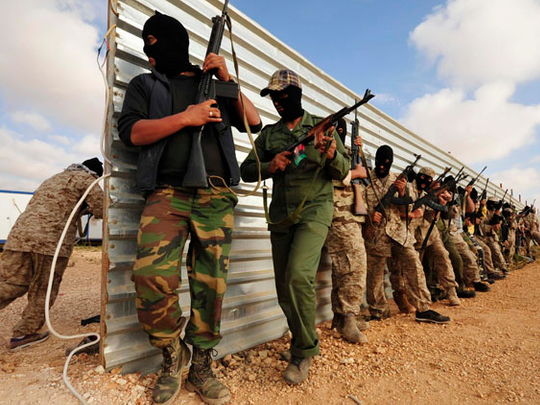
Rome/Tripoli: A coalition of Western and Arab countries has agreed to provide Libyan rebels with millions of dollars in aid to help them in their campaign to drive out Muammar Gaddafi, in power since 1969.
Ministers from the anti-Gaddafi Libya contact group, among them the United States, France, Britain and Italy, Qatar, Kuwait and Jordan, agreed in Rome on Thursday to set up a non-military fund to help the rebels, who are desperately short of cash.
$30 billion Libyan state funds frozen in the US
US Secretary of State Hillary Clinton said Washington would try to change the law to allow it to unlock some of the $30 billion of Libyan state funds frozen in the United States to help the rebel movement.
As the fighting has generally reached stalemate, the rebel Transitional National Council has said it needs up to $3 billion to keep going in the coming months.
Libyan Deputy Foreign Minister Khalid Kaim condemned attempts to use frozen assets to help the rebels. "Any use of the frozen assets is like piracy on the high seas," he said.
"They (the rebels) are not a legal entity. They are not a country. The country is not divided according to a referendum or to a United Nations resolution," he told journalists in Tripoli. "This is illegal ... If we stay silent about it, I think we will be living in a jungle."
Italy, host of the Rome meeting, said a temporary special fund would be set up to channel cash to the rebel administration in its stronghold of Benghazi in eastern Libya.
Qatar promises more than $400 million
Kuwait pledged $180 million and Qatar promised $400 million to $500 million. France said it was evaluating its contribution to the fund, which should be operational within weeks.
A senior US official said only a small fraction of the Libyan money frozen by Washington might be released to the rebels and the cash would not be channelled into the fund.
A second official said the administration was considering unblocking more than $150 million for humanitarian purposes.
Nato planes strike Gaddafi forces
In Zintan, southwest of Tripoli, a rebel spokesman said Nato planes struck Gaddafi's forces and weapons depots west of the rebel-held town in two raids on Thursday.
"As far as we know, T-72 tanks, Grad missile launchers and heavy weaponry are kept in those depots," the spokesman, named Abdul Rahman, told Reuters by telephone.
Earlier, Abdul Rahman said pro-Gaddafi forces had fired about 50 Russian-made Grad rockets into Zintan on Thursday.
Intense fighting in Ghezaya
Near the border with Tunisia, a rebel fighter told Reuters there was intense fighting between rebels and pro-Gaddafi forces in the area of the village of Ghezaya.
The village lies between the Dehiba-Wazin border crossing, which is in rebel hands, and the town of Nalut where residents said Gaddafi loyalists had been shelling rebel positions. Rebels say they are preparing for an attempt by Gaddafi's forces to retake the crossing.
Assets frozen
Late on Thursday a Tunisian security source said more than a dozen mortar rounds fired from Libya had landed near Dehiba, one of them near a reservoir supplying the town with drinking water.
Legal problems have delayed efforts to unblock Libyan state assets frozen overseas or to allow the rebels to sell oil on international markets.
Thursday's meeting brought together foreign ministers from more than 20 countries as well as representatives of the Arab League and the African Union.
Britain said it had no plans to contribute to the fund set up for the rebels because it had already made a "very substantial" contribution to humanitarian assistance.
'Enough food for six to eight weeks'
Josette Sheeran, head of the UN World Food Programme said Libya's food supplies could run out in six to eight weeks.
"If we do not address the larger gaps in the food system in Libya, particularly eastern Libya, we'll have to envision a fairly massive humanitarian operation,"she said in an interview.
An aid ship defied shelling by Gaddafi's forces to rescue more than 1,000 people from Misrata, and the International Organisation for Migration said it arrived safely in Benghazi.
Dazed and emotional migrant workers who arrived on the boat described cowering in fear from relentless shellfire and a desperate scramble to board the vessel as it pulled away.
"I did not know if I would ever get out, I thought I was going to die," said Prince Amalkwah, a 24-year-old Nigerian electrician.
At a meeting in Tripoli on Thursday, about 2,000 tribesmen representing 850 tribes demanded a halt to NATO air strikes and an end to the fighting.
The insurgents trying to topple Gaddafi after 41 years in power had hoped for a swift victory, akin to the overthrow of the leaders of Egypt and Tunisia by popular uprisings.
His better-equipped forces halted the rebels' westward advance from Benghazi and the front line is now largely static.
Britain said it had expelled two more Libyan diplomats because their activities were contrary to British interests.











